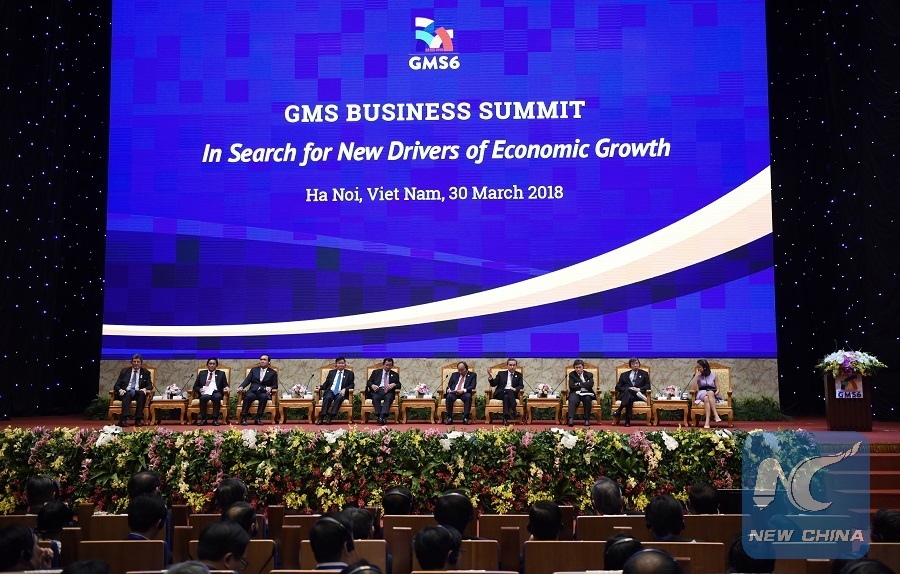
Chinese State Councilor and Foreign Minister Wang Yi (4th R) attends the business summit of the Greater Mekong Subregion (GMS) Economic Cooperation in Hanoi, Vietnam, March 30, 2018. (Xinhua/Wang Shen)
HANOI, March 31 (Xinhua) -- Leaders of the Greater Mekong Sub-region (GMS) countries agreed here on Saturday to take concrete actions to achieve deeper economic integration, greater regional connectivity, closer trade links and financial cooperation, consolidated people-to-people bonds, and closer links with the rest of the world.
At the 6th GMS Summit which concluded in Vietnam's capital on Saturday with the release of a joint summit declaration, the leaders adopted and gave full support to the Hanoi Action Plan (HAP) 2018-2022 and the Regional Investment Framework (RIF) 2022. The HAP is to provide necessary adjustment and sharpen the focus to ensure maximum effectiveness of the GMS Economic Cooperation Program.
To support the HAP, the RIF 2022 was formulated, identifying a pipeline of 227 projects with an indicative cost of 66 billion U.S. dollars. The RIF is a "living pipeline" of projects that will be reviewed and updated regularly to adapt to changing conditions and priorities.
The leaders pledged support for the full realization of the GMS 3 Cs (Connectivity, Competitiveness and Community), the core building blocks of the GMS Economic Cooperation Program.
Specifically, the GMS leaders strongly supported the economic corridor approach that transforms transport networks into transnational economic corridors, linking production, trade and infrastructure. They welcomed the decision to extend the corridor network as a response to the sub-region's dynamism.
Regarding innovation, new technologies and digital transformation as critical new sources of growth, the leaders wanted to boost the GMS Cross-border e-Commerce Cooperation Platform which facilitates growth of e-commerce for higher efficiency, better connectivity and transformation of micro, small and medium enterprises.
The leaders noted recently completed strategies for tourism, safe and environmentally-friendly agro-based value chains, environment and transport. They were committed to further fostering cooperation in health, urban development, hardware and software connectivity and economic corridors, and doubling related capacity-building efforts.
The leaders encouraged greater cooperation among member countries in undertaking trade promotion activities, accelerating the development of economic corridors and cross-border trade infrastructure, and improving trade management capacity. They encouraged implementation of China-ASEAN Free Trade Area and early conclusion of the Regional Comprehensive Economic Partnership (RCEP).
Recognizing the crucial role of regional cooperation and integration in promoting economic development and showing support for the principles of open regionalism, the leaders will seek to tap synergy and complementarity between the GMS program and other global and regional initiatives, including the ASEAN Community, the Belt and Road Initiative, the Mekong-Lancang Cooperation mechanism, and the Cambodia-Laos-Myanmar-Vietnam Cooperation, among others.
At the summit, Chinese State Councilor and Foreign Minister Wang Yi pointed out four necessary actions GMS countries should take to break new ground in the development and cooperation in the sub-region. According to him, the countries need to "foster stronger growth," "support openness in our practical cooperation," "improve our network of connectivity," and "deepen our partnership."
"The GMS, once an important area along the ancient Maritime Silk Road, is now where the Silk Road Economic Belt connects with the 21st Century Maritime Silk Road. This puts the GMS countries in a solid and unique position in the Belt and Road cooperation," he said.
Meanwhile, President of the Asian Development Bank Takehiko Nakao said "Today, GMS countries are among the fastest growing economies in Asia and the world. They recognize the benefits of being regionally integrated and globally connected. ADB will continue to facilitate the GMS Program, which has been built on mutual trust and the 3 Cs' of connectivity, competitiveness and community."
The GMS Program has supported projects worth 21 billion U.S. dollars since its establishment in 1992 in sectors such as transport, tourism, health, urban development, environment, human resources development, agriculture and energy.
The 7th GMS Summit will be held in Cambodia in 2021.

